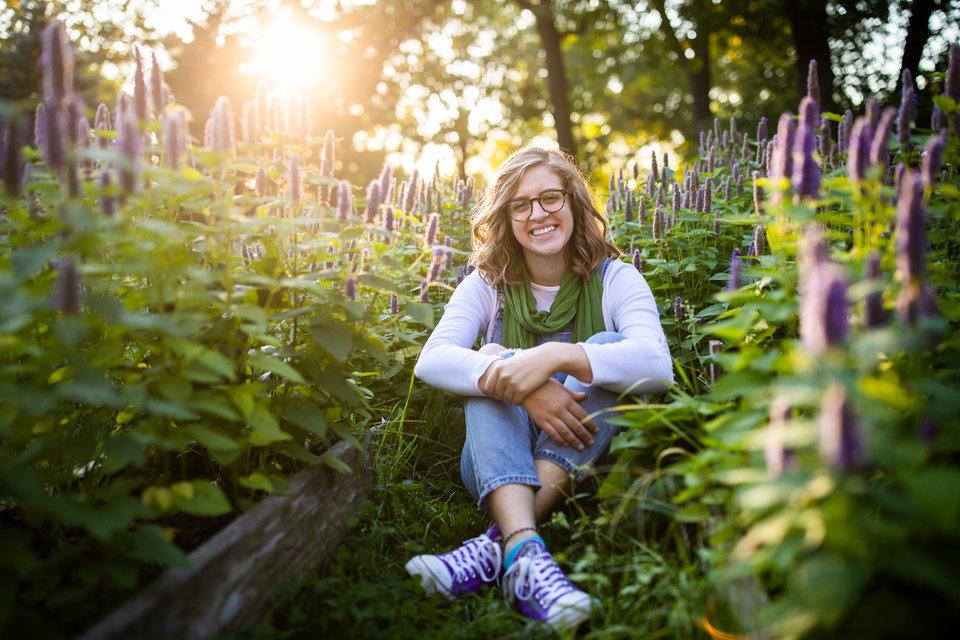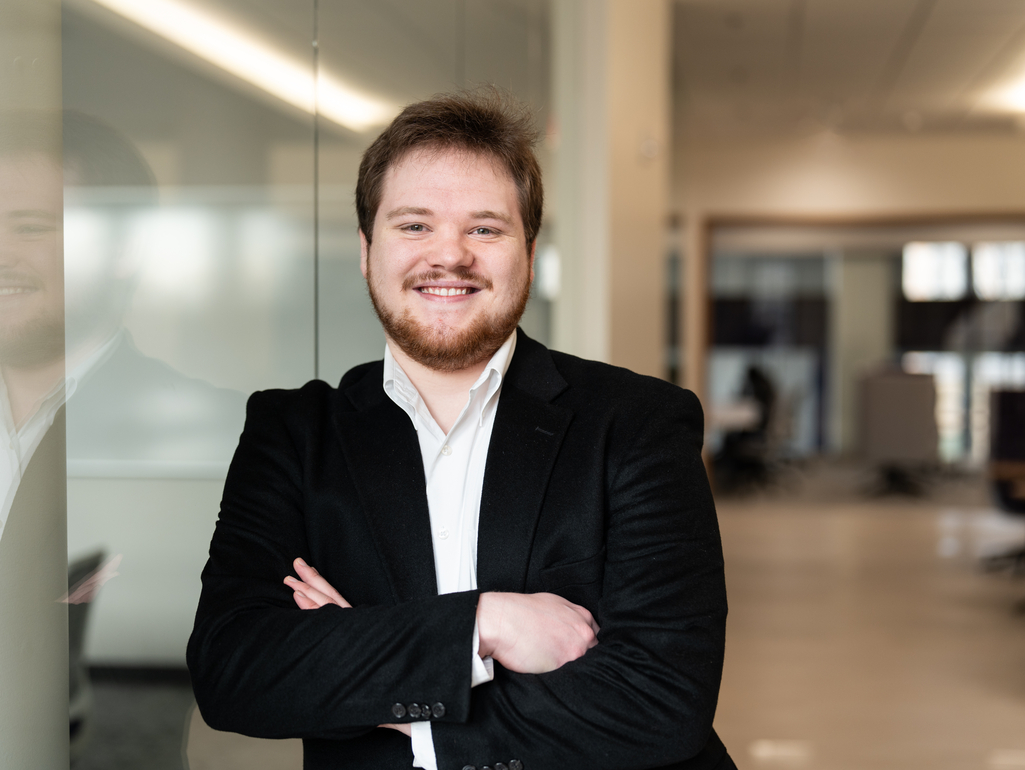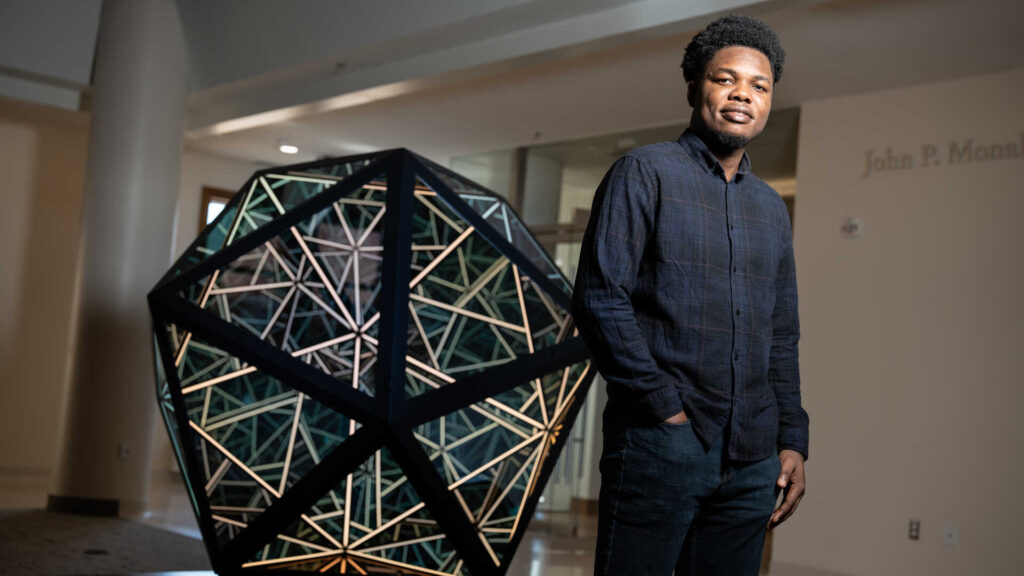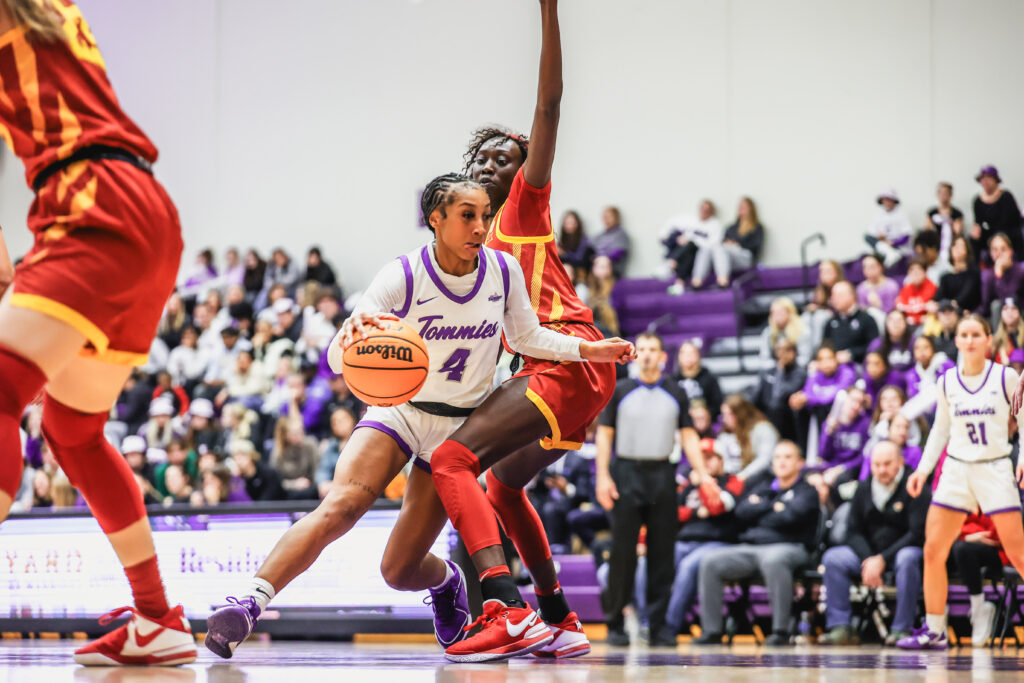Humans of St. Thomas introduces us to some of the incredible members of the St. Thomas community. Read about more of our fellow Tommies here.
It took about 10 minutes for Emma Smith to pick her all-time favorite song, but it didn't take long at all to see that she has a deep passion for sustainability.
This passion began with her father, who also happened to be her religion teacher at one point. While he was her teacher, he noticed she thrived learning about the environment. It is no surprise that her dad then had a huge influence on how she came to St. Thomas and picked her courses of study.
"Both of my parents went to St. Thomas and they got married here at the Chapel, so my dad was thinking that I would end up here too," she said.
He told her to take a Justice and Peace introductory class and she ended up loving it. Now a senior studying Justice and Peace, Environmental Studies, and American Culture and Difference, Smith is determined to work on the climate crisis for the rest of her life, whether through environmental politics, education or research.
"There is no set path for me. To me, it is freeing that I don't have to do one thing for the rest of my life," she said.
Smith is also quite involved on campus, from being an orientation and Welcome Days leader this summer to being a part of Students for Justice and Peace and a VISION leader. She was also the sustainability chair for the Undergraduate Student Government (USG) last year and is now interning at St. Paul Mayor Melvin Carter's office of sustainability.
I had the opportunity to sit down with Emma Smith to discuss her involvement on campus, her different sustainability projects, and learn more about her love for musicals.
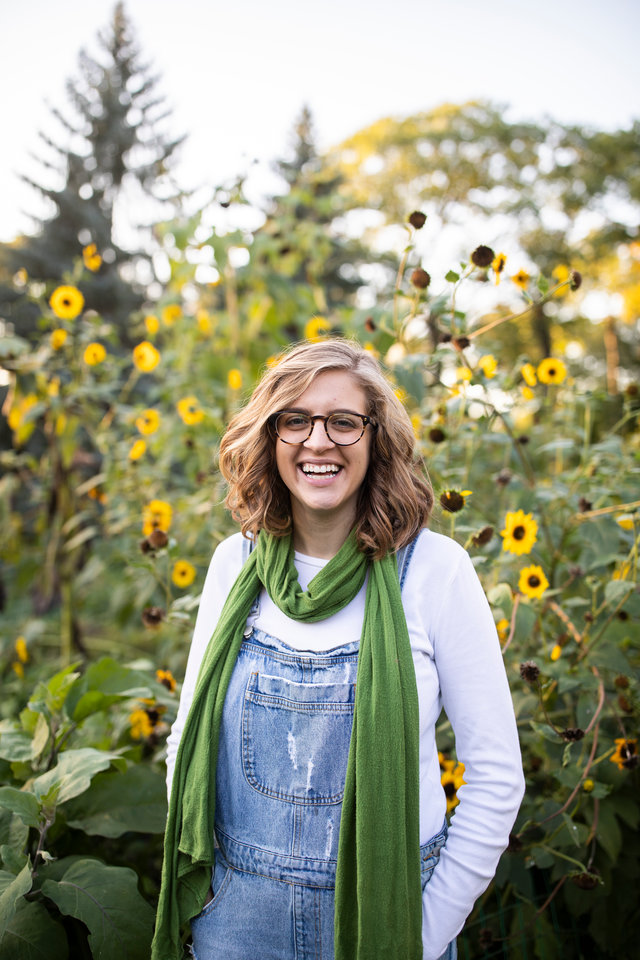
Portrait of student Emma Smith in the Stewardship Garden on the St. Paul campus. (Liam Doyle/University of St. Thomas)
Why are you so passionate about sustainability?
I have a distinct memory. I was in fifth or sixth grade and it was the middle of January. My dad and I were driving in the car. He was listening to MPR and they were talking about how polar bears were losing their homes and the glaciers were melting because of fossil fuels warming the atmosphere. That was the first time I had ever heard something like that. I was like, 'Dad, we have to stop driving because it is hurting these animals and the planet.' That was my first memory of me caring about that stuff.
It was really during my Introduction to Justice and Peace class during fall semester of 2016 where we spent a few days learning about the climate crisis. It was the first time I had been like, 'Are you serious?' I didn't realize how dire the situation was. At that point, my mindset was that if I am not working on sustainability or working to alleviate this climate crisis, nothing else I even want to do in the future will matter because the world will be uninhabitable, for humans at least. Knowing my decisions in the United States impact those living around the world that aren't even contributing to it. It feels super unethical to me to not focus on sustainability and to not focus on climate change and how it's impacting marginalized people, especially. A lot of my other passions that I have held for a long time wouldn't be possible without a healthy planet. At this point, it is just what I do because, if not me, who is doing it?
What will you be doing at Mayor Carter's office?
I am working on energy benchmarking and their new climate change resiliency plan. This basically analyzes how climate change will be impacting different communities in St. Paul. Part of that is this program called Energize Saint Paul, which is a benchmarking program that gives larger buildings the tools to benchmark their energy. You can basically track how much water and energy you are using and how much you are wasting. When you do that year after year, you'll be able to see where you are losing money and hurting the environment. It is also about figuring out where you can cut those expenses and be more efficient. The main research I am doing with that is focusing on how to take information from multifamily homes, like apartments and condos, and create a program with some more incentives to get more people involved. It also involves trying to find the best way to implement the information we gather from the benchmarking program to make it more realistic for all those families and those buildings to be able to use.
I also proposed to work on an equity implementation process for the climate action plan. The plan has a lot of really great things talking about how communities of color and marginalized communities are the most impacted by climate change, even in St. Paul. But as of right now, there hasn't been a lot of action in prioritizing those communities. I want to be able to figure out how this plan is going to be prioritized for communities of color. My Justice and Peace studies allow me to pick up on these things quickly, which is ultimately the kind of work I want to be doing because it surrounds equity and justice issues.
You were the USG sustainability chair. What did that entail?
I ran for it because I was trying to get more involved. No one had ran for it the past couple years. The job description said, "report back from sustainability committee to USG" and I was like, 'What sustainability committee?' There were no clear roles, so I just did with it what I wanted to do and what I thought the school needed. Because of Justice and Peace studies, I had a very activist approach to leading the committee. We had our first meeting and we changed the name to the Sustainability Coalition. Our idea was that there are so many clubs and different things around campus that are trying to do work around sustainability, like BrightSide, Environmental Studies, Students for Justice and Peace, Food Justice Club. None of them talk to each other or work together to do anything. I just wanted a space for them to come together and to talk with each other, try to plan events, and network. They are all spread apart, but if they were working together in their different sectors, they could have a greater role.
I also sat on the Sustainability Council for the university. We are now in the third year of a three-year grant of trying to gather information for a sustainability plan and how to implement it. We talked a lot about that at the Sustainability Council. I had no idea all of this sustainability stuff was happening at St. Thomas, so it was cool exposure. The coalition wanted to do an action step, so we decided to do Sustainability Week last spring. The point of the week wasn't so you could go to every event; it was more about what intrigues you about an event. I thought it was a successful week of outreach. I hope people won't stop thinking about it.
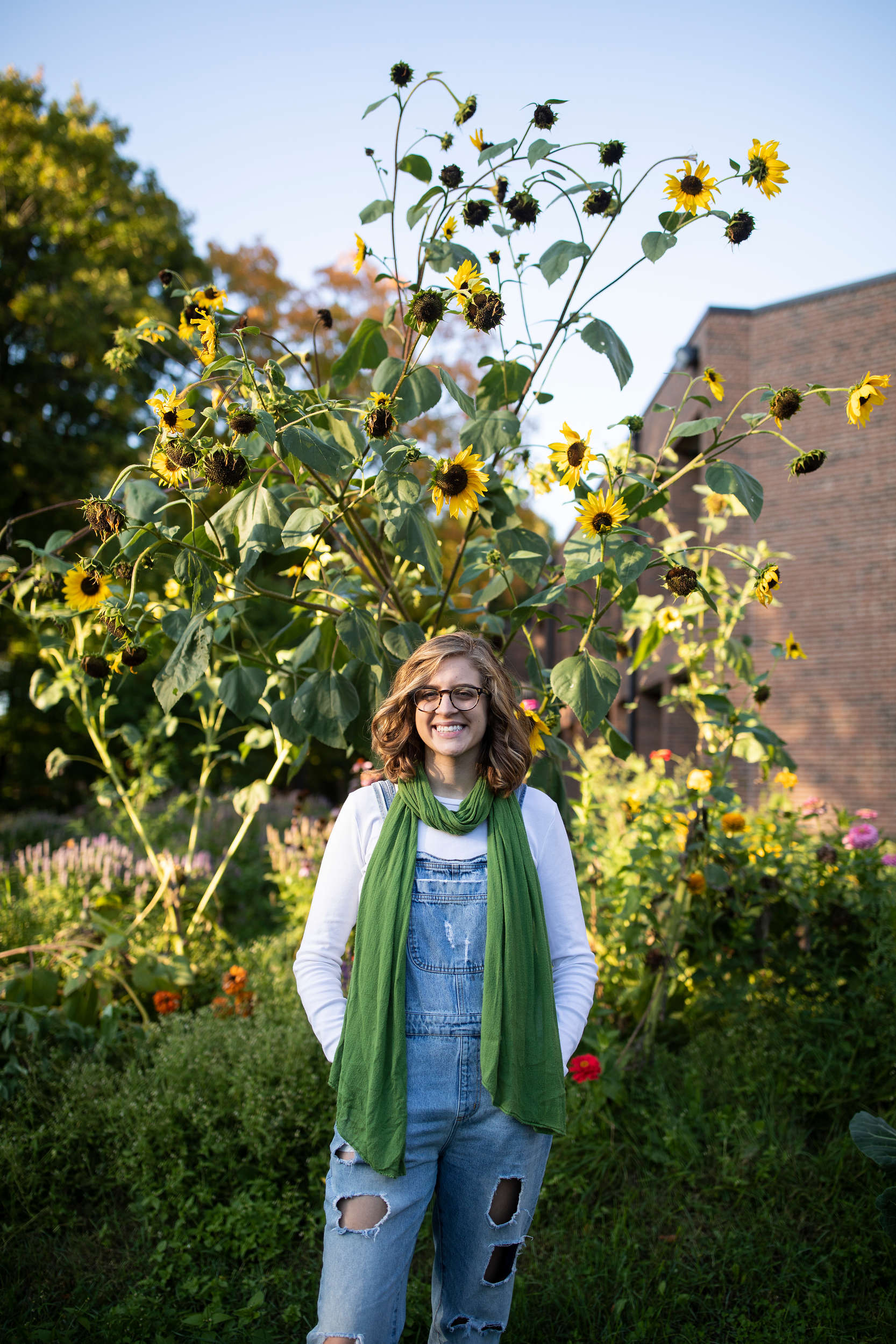
What is your favorite song?
"You Get What You Give" by the New Radicals. I am all for looking on the bright side of things, but sometimes you have to acknowledge that you are not doing super well. I think that song is more on the bright side of things, but it is also like, 'Yeah, things can suck sometimes.' But if you put your work, effort and love into things, then good things will come from it. That is what I take from that song. My music taste is really strange and I have lot of presumptuous music friends who are really into music I have never heard of.
You like musicals. What is your favorite?
I love musicals. It is my favorite genre. The reason I love musicals so much is because telling stories through song is really cool. They use the music to tell the story, but they are also just songs that people sing that are incredible. "Rent" really encompasses the importance of friendship and relying on other people. It is a roller coaster of emotions and it talks a lot about certain justice issues and how everyday people deal with them. The entire show is full of outcasts. None of the main characters have had easy lives or been accurately represented. It talks a lot about HIV and AIDS because it takes place in the late '80s in New York. The story is based off an opera. The author of the show had HIV and wrote this musical. A day or two before opening night on Broadway, he passed away. The entire backstory and love that was put into the story is really inspiring. I could talk about "Rent" for a long time.
What was your dream job when you were younger?
My funniest one that I can remember was for a while I wanted to be a librarian. My school librarian was really important to me when I was little. I just wanted to bring books to people and engage with that. I also wanted to be an astronaut for a while then I realized I sucked at science. So that was that.
What are some of your hobbies?
I always tell people I don't have time for hobbies. I would say when it is cold out, knitting is something I like to do. It calms me. I am also a pop culture junkie so I will spend a lot of time keeping updated with that. It is so shallow, but I also think it is my American Culture and Difference interest where I like learning about that stuff and being engaged with that.
Do you have a favorite TV show?
"Jane the Virgin" is my favorite TV show. That show made my fall semester of 2018 exponentially better. It is so good. I binge all of it. I haven't watched the last season yet, so no spoilers. I haven't watched it yet because I haven't had time. I have seen photos of how it ends, but I just want to know what happens.
If you could only eat one food for the rest of your life, what would it be?
When I was in San Francisco for my study abroad, there was this vegan restaurant called Golden Era and they had vegan orange chicken. It was orange chicken with rice, but it is vegan so it is made out of soy or something. I could literally eat that specific dish from that restaurant for every single meal. I would never get tired of it. That would be everything for me.
